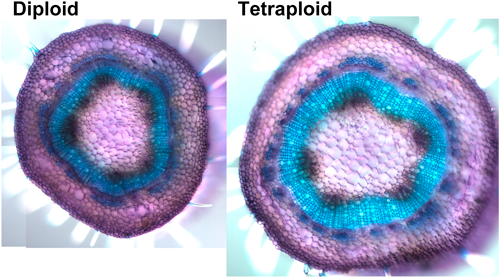- 著者
- Chikage Umeda-Hara Hidekazu Iwakawa Misato Ohtani Taku Demura Tomoko Matsumoto Jun Kikuchi Koji Murata Masaaki Umeda
- 出版者
- Japanese Society for Plant Biotechnology
- 雑誌
- Plant Biotechnology (ISSN:13424580)
- 巻号頁・発行日
- vol.39, no.3, pp.215-220, 2022-09-25 (Released:2022-09-25)
- 参考文献数
- 28
Somatic polyploidization often increases cell and organ size, thereby contributing to plant biomass production. However, as most woody plants do not undergo polyploidization, explaining the polyploidization effect on organ growth in trees remains difficult. Here we developed a new method to generate tetraploid lines in poplars through colchicine treatment of lateral buds. We found that tetraploidization induced cell enlargement in the stem, suggesting that polyploidization can increase cell size in woody plants that cannot induce polyploidization in normal development. Greenhouse growth analysis revealed that radial growth was enhanced in the basal stem of tetraploids, whereas longitudinal growth was retarded, producing the same amount of stem biomass as diploids. Woody biomass characteristics were also comparable in terms of wood substance density, saccharification efficiency, and cell wall profiling. Our results reveal tetraploidization as an effective strategy for improving woody biomass production when combined with technologies that promote longitudinal stem growth by enhancing metabolite production and/or transport.
- 著者
- Keito Mineta Junya Hirota Kesuke Yamada Takashi Itoh Poyu Chen Hidekazu Iwakawa Hirotomo Takatsuka Yuji Nomoto Masaki Ito
- 出版者
- Japanese Society for Plant Biotechnology
- 雑誌
- Plant Biotechnology (ISSN:13424580)
- 巻号頁・発行日
- vol.40, no.4, pp.353-359, 2023-12-25 (Released:2023-12-25)
- 参考文献数
- 20
Although it is well known that hierarchical transcriptional networks are essential for various aspects of plant development and environmental response, little has been investigated about whether and how they also regulate the plant cell cycle. Recent studies on cell cycle regulation in Arabidopsis thaliana identified SCARECROW-LIKE28 (SCL28), a GRAS-type transcription factor, that constitutes a hierarchical transcriptional pathway comprised of MYB3R, SCL28 and SIAMESE-RELATED (SMR). In this pathway, MYB3R family proteins regulate the G2/M-specific transcription of the SCL28 gene, of which products, in turn, positively regulate the transcription of SMR genes encoding a group of plant-specific inhibitor proteins of cyclin-dependent kinases. However, this pathway with a role in cell cycle inhibition is solely demonstrated in A. thaliana, thus leaving open the question of whether and to what extent this pathway is evolutionarily conserved in plants. In this study, we conducted differential display RT-PCR on synchronized Nicotiana tabacum (tobacco) BY-2 cells and identified several M-phase-specific cDNA clones, one of which turned out to be a tobacco ortholog of SCL28 and was designated NtSCL28. We showed that NtSCL28 is expressed specifically during G2/M and early G1 in the synchronized cultures of BY-2 cells. NtSCL28 contains MYB3R-binding promoter elements, so-called mitosis-specific activator elements, and is upregulated by a hyperactive form of NtmybA2, one of the MYB3R proteins from tobacco. Our study indicated that a part of the hierarchical pathway identified in A. thaliana is equally operating in tobacco cells, suggesting the conservation of this pathway across different families in evolution of angiosperm.
- 著者
- Chikage Umeda-Hara Hidekazu Iwakawa Misato Ohtani Taku Demura Tomoko Matsumoto Jun Kikuchi Koji Murata Masaaki Umeda
- 出版者
- Japanese Society for Plant Biotechnology
- 雑誌
- Plant Biotechnology (ISSN:13424580)
- 巻号頁・発行日
- pp.22.0716a, (Released:2022-09-17)
- 参考文献数
- 28
Somatic polyploidization often increases cell and organ size, thereby contributing to plant biomass production. However, as most woody plants do not undergo polyploidization, explaining the polyploidization effect on organ growth in trees remains difficult. Here we developed a new method to generate tetraploid lines in poplars through colchicine treatment of lateral buds. We found that tetraploidization induced cell enlargement in the stem, suggesting that polyploidization can increase cell size in woody plants that cannot induce polyploidization in normal development. Greenhouse growth analysis revealed that radial growth was enhanced in the basal stem of tetraploids, whereas longitudinal growth was retarded, producing the same amount of stem biomass as diploids. Woody biomass characteristics were also comparable in terms of wood substance density, saccharification efficiency, and cell wall profiling. Our results reveal tetraploidization as an effective strategy for improving woody biomass production when combined with technologies that promote longitudinal stem growth by enhancing metabolite production and/or transport.


